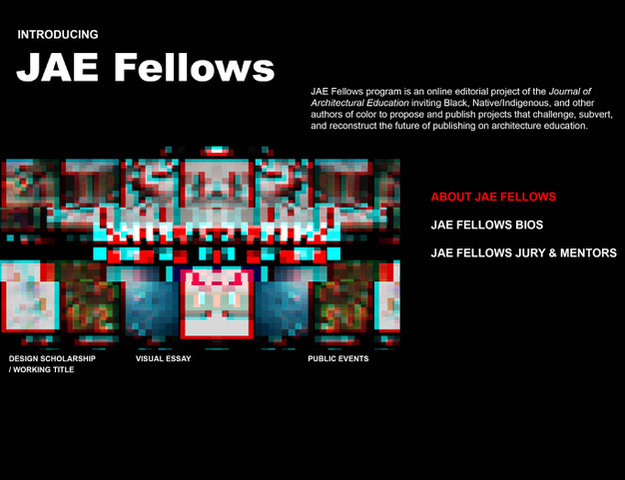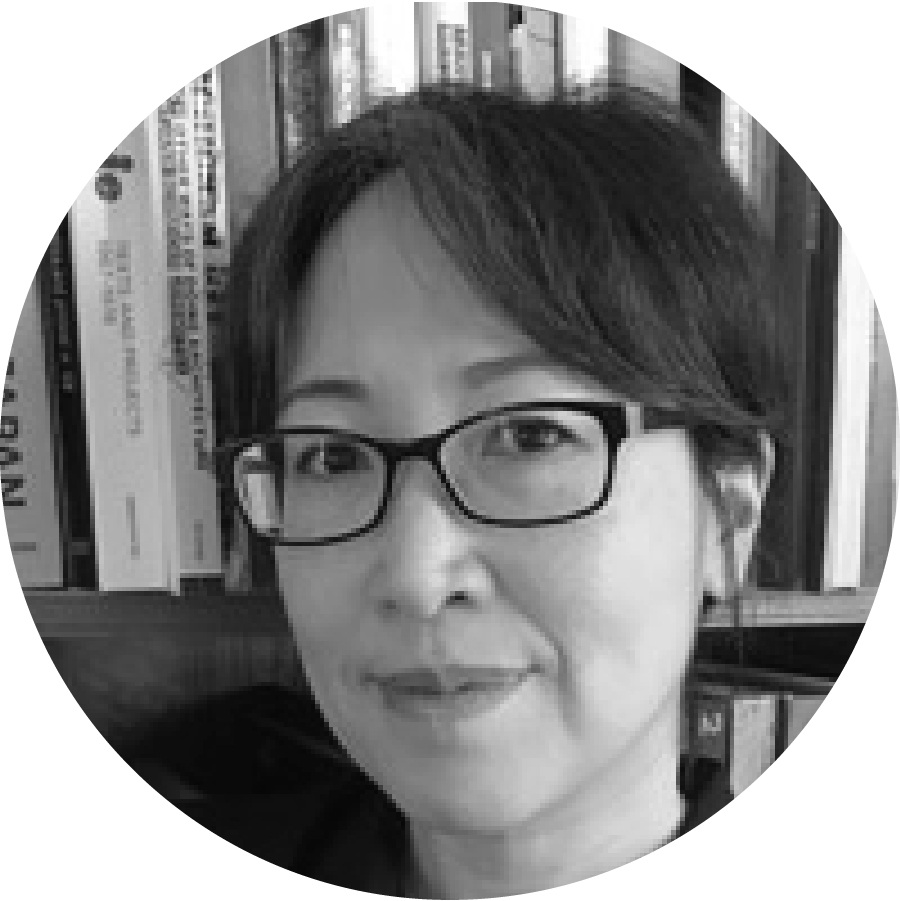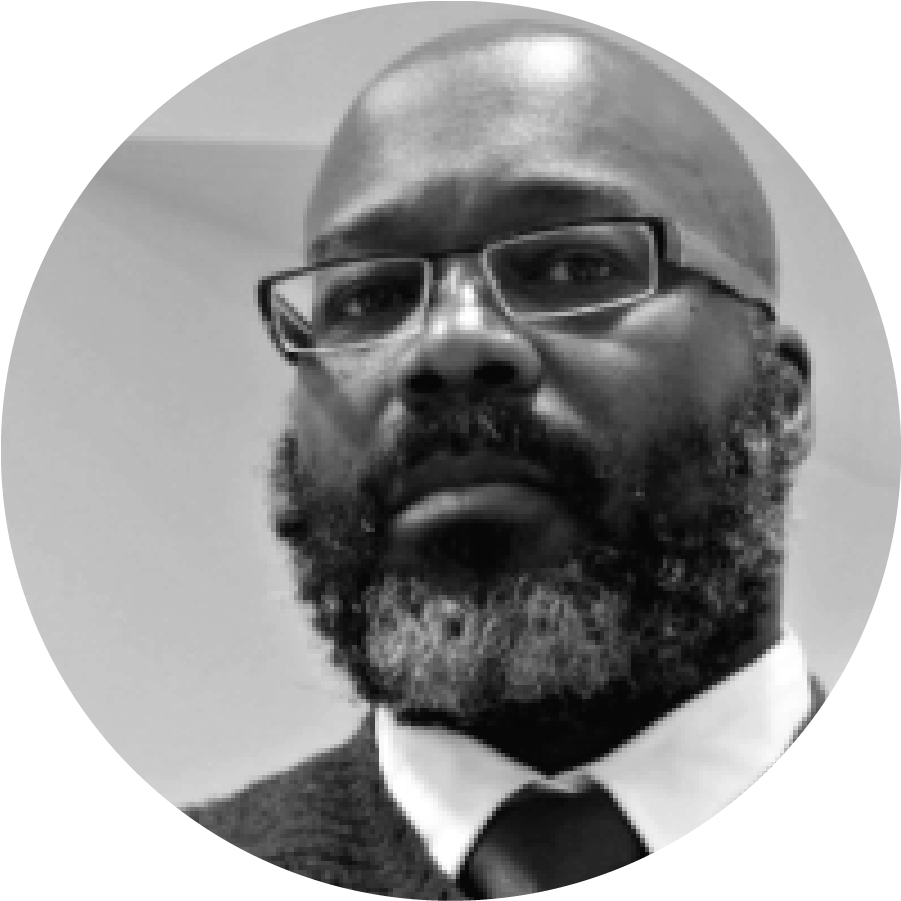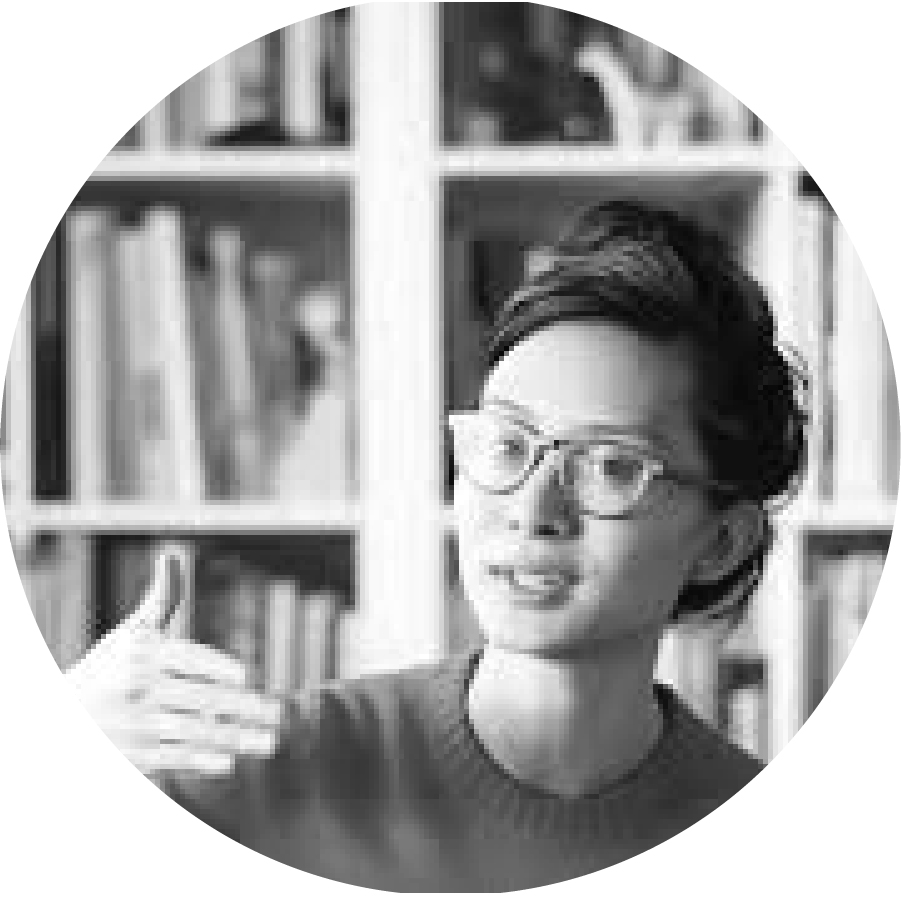JAE Fellows Program for BIPOC Writers and Designers Awarded Graham Foundation Grant
September 3, 2021

Mock-up of JAE Fellows platform on jaeonline.com, 2021
Associate Professor Ozayr Saloojee, along with Nora Wendl (University of Mexico) at the Journal of Architectural Education (JAE), and Michael Monti (Association of Collegiate Schools of Architecture), is pleased to announce the journal has received funding for the development of the JAE Fellows program.
The Graham Foundation for Advanced Studies in the Fine Arts awarded a 2021 grant to the Association of Collegiate Schools of Architecture (ACSA) which publishes the journal. See the ACSA media release here.
The funding will allow the JAE to grant yearlong fellowships to support the research of Black, Native/Indigenous, and other authors of colour and create an online platform to publish their projects on JAEOnline.org.
Additional programming is planned to highlight the Fellows’ work, such as webinars, interviews, online conversations, and other events to engage a broader public, including students, and open an expansive discourse on the future of disciplinary scholarship and publication.
“We are so pleased that the Graham Foundation has funded the JAE Fellows Project and look forward to how we can expand architectural discourse by supporting the work of BIPOC scholars, teachers, designers and researchers,” said Dr. Saloojee, JAE Associate Editor of Design.
“We are especially delighted that there is such an exceptional team of mentors and jurors who have agreed to work on this important, and we hope, enduring initiative.”
Saloojee teaches at the Azrieli School of Architecture & Urbanism at Carleton University, where he co-directs, with Assistant Professor Catherine Bonier, the Carleton Urban Research Lab. He is cross appointed with Carleton’s Institute of African Studies and is also co-founder of the Ottawa-based design practice, SALVO, with Associate Professor Johan Voordouw.
The JAE fellowships will support BIPOC writers and designers—whether individually or in a collective—who are not affiliated full-time with a university. Fellows will be selected by a Jury of Mentors based upon their proposal, which will define the scope of their project.
The Jury of Mentors comprises 11 prominent designers, historians, artists, architects, and educators: Neeraj Bhatia, Jay Cephas, Sarah Deyong, Nathalie Frankowski, Cruz Garcia, Joyce Hwang, Jennifer Newsom, Ivonne Santoyo-Orozco, Mitchell Squire, Thena Tak, and Huda Tayob. See their profiles below.
The Call for Fellows is expected to open in October 2021.
The JAE Fellows Program was developed to respond to the recognized need for further structural support of Black, Native/Indigenous Peoples, and other people of colour in architectural discourse. It is an initiative of Saloojee, JAE Executive Editor Nora Wendl, and ACSA Executive Director Michael J. Monti.
JAE encourages the expansion of architectural discourse by Fellows through nontraditional presentation methods, including primarily visual work, collectively authored work, documentary work, and other writing genres.
JURY OF MENTORS

Neeraj Bhatia is a licensed architect and urban designer whose work resides at the intersection of politics, infrastructure, and urbanism. He is an associate professor at California College of the Arts, where he directs the Urban Works Agency. In addition, Bhatia founded The Open Workshop, a design-research office examining the negotiation between architecture and its territorial environment. Distinctions include the Architectural League Young Architects Prize, Emerging Leaders Award from Design Intelligence, and the Canadian Prix de Rome. He is co-editor of the books Bracket [Takes Action], The Petropolis of Tomorrow, Bracket [Goes Soft], Arium: Weather + Architecture, and co-author of Pamphlet Architecture 30: Coupling — Strategies for Infrastructural Opportunism and New Investigations in Collective Form. Bhatia has a master’s degree in architecture and urbanism from Massachusetts Institute of Technology and a bachelor of environmental studies and architecture from University of Waterloo. He is a member of the Editorial Board of the Journal of Architectural Education.

Jay Cephas is an assistant professor of the history and theory of architecture at Princeton University, where his research investigates the relationships between technology, identity, and spatial practices. Cephas recently served as a 2019 W.E.B. Du Bois Fellow at the University of Massachusetts Amherst and undertook research examining the encounter between racial difference and the history of urban theory through the work of W.E.B. Du Bois. His forthcoming book delves into the “structuring structures” of industrial urbanism by analyzing the agonism entangling technical systems, labour practices, and the urban imaginary in early 20th century Detroit. He is an associate editor for a forthcoming issue of the Journal of Architectural Education and served on the at-large Editorial Board from 2018–21. Cephas received a Graham Foundation grant for the Black Architects Archive in 2020.

Sarah Deyong is an associate professor of architecture at the University of Nebraska-Lincoln. She has a bachelor’s in architecture from the University of Toronto and a doctorate from Princeton University. Her current book project focuses on pedagogy in the design studio. With grants from the Graham Foundation and the Glasscock Center of the Humanities, she has published in peer-reviewed journals such as the JAE, the JSAH, Praxis, AD, The Journal of Architecture, and Journal of Visual Culture. She is a co-author of The Changing of the Avant–Garde: Visionary Architectural Drawings from the Howard Gilman Collection (Museum of Modern Art, 2002). Her essay, “Rethinking the Legacy of the Sixties: Pliny Fisk’s Political Ecology,” published in the Journal of Architectural Education in 2014, garnered an ACSA/JAE Best Scholarship of Design Award. She is a member of the Editorial Board of the Journal of Architectural Education.

Joyce Hwang is an associate professor and associate chair of architecture at the University at Buffalo, State University of New York, and the founder of Ants of the Prairie, an office of architectural practice and research that focuses on confronting contemporary ecological conditions through creative means. She is a recipient of the Architectural League Emerging Voices Award, the New York Foundation for the Arts Fellowship, and the MacDowell Fellowship. Hwang is on the Steering Committee for US Architects Declare, serves as a Core Organizer for Dark Matter University, and is a member of the Editorial Board of the Journal of Architectural Education. She is a registered architect in New York State, and has practiced professionally with offices in New York, Philadelphia, San Francisco, and Barcelona. She received a post-professional MArch from Princeton University and a bachelor’s in architecture from Cornell University.

Jennifer Newsom is a licensed architect, artist, and principal of Dream The Combine, based in Minneapolis, MN and Ithaca, NY. She is an assistant professor at Cornell University.Through Dream The Combine, which was founded with Tom Carruthers in 2013, Newsom has co-produced numerous site–specific installations in the United States and Canada that explore metaphor, perceptual uncertainties, and the boundary between real and illusory space. They are winners of the 2018 Young Architects Program at MoMA PS1 for their installation Hide & Seek and were named winners of the 2020–21 J. Irwin and Xenia S. Miller Prize. Newsom’s research lies in the space between real, tangible bodies made of flesh, steel, glass, etc., and the perception of these bodies through vision. She earned her Bachelor of Arts and MArch from Yale University.

Ivonne Santoyo-Orozco is an architect, educator, and theorist. She is an assistant professor of architecture at Bard College where she also co-directs the architecture program. She has taught at the Architectural Association, Iowa State University, University for the Creative Arts, and Central Saint Martin’s College of Art and Design, and has professionally collaborated with Arup Integrated Urbanism, Foster + Partners, Wiel Arets, and Fernando Romero. Her research explores architecture as an interface between contemporary forms of governance and capital. She is at work on an architectural genealogy of property regimes in Mexico. She is widely published, and has exhibited at Think Space in Zagreb, the Venice Biennale, and Storefront for Art and Architecture in New York. She holds a Bachelor of Art in architecture from Universidad de las Américas Puebla in Mexico, a MArch from the Berlage Institute, and a doctorate from the Architectural Association.

Mitchell Squire is an architect, artist, storyteller, toymaker, and provocateur. He is also an associate professor of architecture at Iowa State University. In 2010, he was a resident of the Skowhegan School of Painting and Sculpture as well as one of seven artists to receive the Midwestern Voices and Visions award, spending five weeks in residence at Ox-Bow, a Michigan school affiliated with the Art Institute of Chicago. He received his bachelor’s in architecture and MArch from Iowa State University. He joined that faculty in 2001 and teaches, among other courses, a seminar on ethics and esthetics titled “Goodness and Beauty,” and a design studio on toys and the role of playfulness, curiosity, and “trouble-making” in intellectual development and problem–solving. Squire has held visiting appointments at the University of Michigan and the Bernard & Anne Spitzer School of Architecture, City College of New York.

Thena Tak is the founder and principal of LILO: Little Office and is a lecturer at the University of British Columbia School of Architecture and Landscape Architecture, where she teaches graduate-level option design studios, research methods, and advanced digital media. Her current research engages the notion of surrogates as both a point of inquiry and a working methodology with a particular focus on its relationship to the more-than-human-world. Prior to teaching, Tak worked professionally at a number of renowned offices including Vincent James Architects Associates in Minneapolis, Howeler and Yoon Architecture in Boston, and Barkow Leibinger Architects in Berlin. She holds a MArch with Distinction from the Harvard University Graduate School of Design and a bachelors from Cornell University Architecture, Art and Planning.

Huda Tayob is a senior lecturer at the University of Cape Town. She is a former program convenor of history and theory and coleader of Unit 18 at the Graduate School of Architecture, University of Johannesburg. Her general academic interests include a focus on minor and subaltern architectures, and the potential of literature to respond to archival silences in architectural research. Her recent publications include “Subaltern Architectures: Can Drawing ‘Tell’ a Different Story?” (Architecture and Culture, 2018) and “Architecture-by-Migrants: The Porous Infrastructures of Bellville” (Anthropology Southern Africa, 2019). She is co-curator of the open–access curriculum project RaceSpaceArchitecture.org with Suzi Hall and Thandi Loewenson, and the Archive of Forgetfulness (2020–21), a pan–African online exhibition and podcast series. She holds a MArch from the University of Cape Town and a doctorate from the Bartlett School of Architecture in London.

WAI Architecture Think Tank (WAI) is a planetary studio practicing by questioning the political, historical, and material legacy and imperatives of architecture and urbanism through a panoramic and critical approach. It was founded in Brussels during the financial crisis of 2008 by Puerto Rican architect, artist, curator, educator, author, and theorist Cruz Garcia and French architect, artist, curator, educator, author, and poet Nathalie Frankowski. WAI is one of their several platforms of public engagement that include Beijing-based anti-profit art space Intelligentsia Gallery, and the free and alternative education platform and trade-school Loudreaders. Based on the emancipating and persecuted alternative practice of education performed by lectores like Luisa Capetillo in the tobacco factories in the Caribbean, Loudreaders is an open pedagogical platform and free trade school that engages with architectural education as a form of mutual aid and critical solidarity amid COVID-19. Cruz and Frankowski are members of the JAE Fellows Jury.
About the Association of Collegiate Schools of Architecture
Founded in 1912, the mission of the Association of Collegiate Schools of Architecture (ACSA) is to lead architectural education and research. ACSA provides venues for international peer review and recognition in the form of scholarly journals, conferences, awards, and student design competitions. ACSA provides intelligence and insight for our members through data collection and analysis, and we work to enhance teaching and research across the discipline through our volunteer members and often in partnership with peer organizations around the world. ACSA designs activities to shape the future of architecture by empowering faculty to understand and act within a dynamic world. Similarly, ACSA engages with prospective students and their families through StudyArchitecture.com, a portal to learn about the path into the profession and to connect directly with member schools.
About the Journal of Architectural Education
The Journal of Architectural Education is a biannual peer-reviewed academic journal published by Routledge, Taylor & Francis on behalf of the Association of Collegiate Schools of Architecture. The JAE has been the primary venue for research and commentary on architectural education since it was founded in 1947, making it the oldest continuing operating journal of its kind.
About the Graham Foundation
Founded in 1956, the Graham Foundation for Advanced Studies in the Fine Arts
fosters the development and exchange of diverse and challenging ideas about
architecture and its role in the arts, culture, and society.